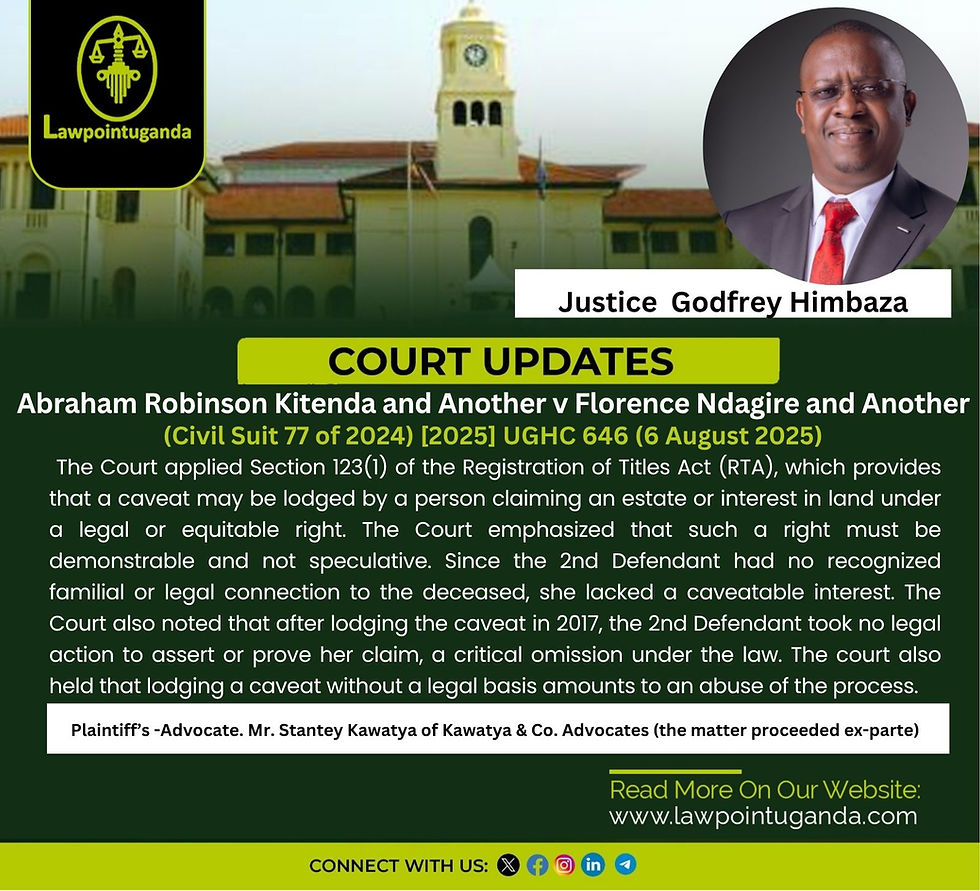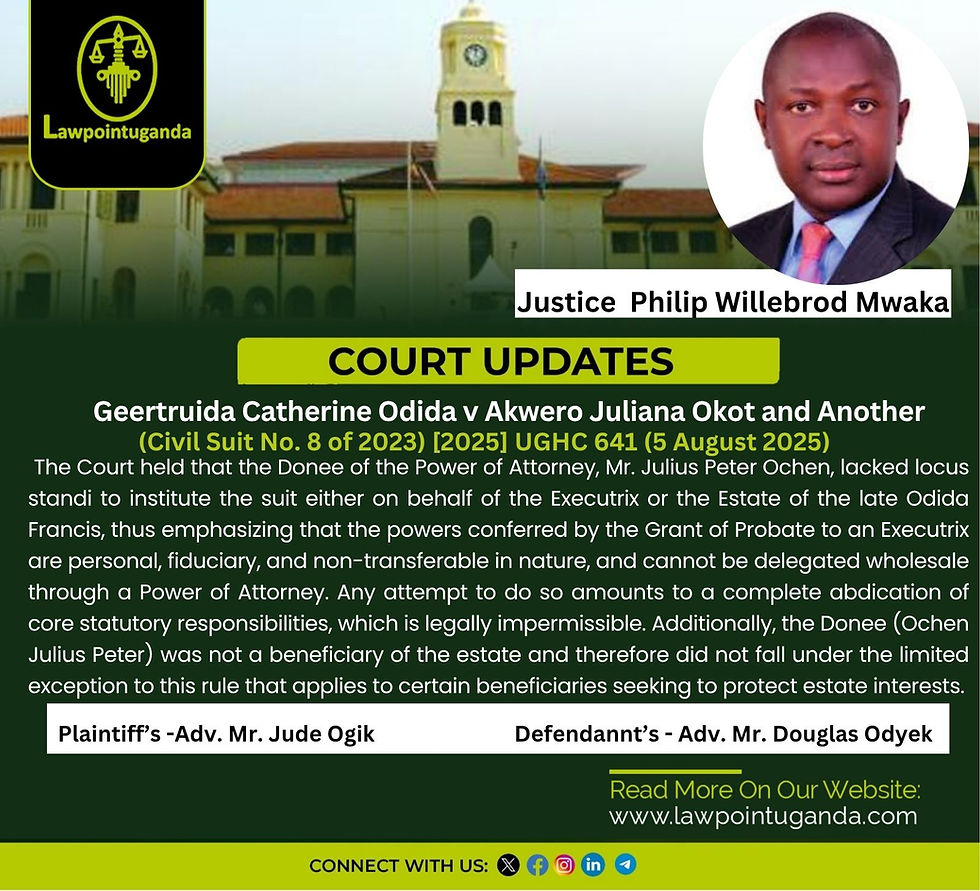High Court Declares Caveats Lodged by Non-Beneficiaries Invalid under Section 123(1) of the Registration of Titles Act and awards damages for Trespass
- Waboga David

- Aug 8, 2025
- 4 min read

Introduction
In Ugandan land law, the term caveat—derived from the Latin for “beware”—functions as a legal warning to third parties that another person claims a priority interest in the land.
Under Section 123(1) of the Registration of Titles Act, a person claiming an interest in registered land, such as a beneficiary of a deceased estate, may lodge a caveat to prevent unauthorized dealings with the property until their claim is resolved.
Notably, beneficiary caveats do not lapse automatically and can only be removed by court order or at the instance of the caveator.
However, the protection offered by a caveat is temporary and conditional—not a license to delay or obstruct rightful proprietors or administrators. As emphasized by Hon. Lady Justice Joyce Kavuma in Magembe v Kayondo & 2 Others (Misc. Cause No. 26 of 2023) [2024] UGHC 447, a caveat must be supported by sufficient grounds, a timely legal claim, and a demonstrable balance of convenience. If the caveator fails to pursue their interest promptly, the caveat risks removal as an abuse of process.
In a recent decision of Abraham Robinson Kitenda and Another v Florence Ndagire and Another (Civil Suit 77 of 2024) [2025] UGHC 646 (6 August 2025) , the High Court revisited these principles in a dispute over the estate of the late Capt. James Katumwa Kiwanuka. The Court addressed whether individuals claiming familial ties—but not legally recognised as beneficiaries—could lawfully lodge and maintain caveats against registered land in an estate, and whether their actions constituted trespass. Applying Section 123(1) and related provisions of the Registration of Titles Act, the Court held that the defendants lacked any caveatable interest and that their actions unlawfully interfered with the administration of the estate.
Facts
The Plaintiffs, being administrators of the estate of the late Capt. James Katumwa Kiwanuka.
The Defendants, who claimed to be a widow and a daughter of the deceased, leased the estate land to third parties and lodged caveats in 2015 and 2017, respectively.
The Plaintiffs contended that the Defendants were neither listed as children nor dependents in the petition for letters of administration and had no legal or equitable interest in the estate.
The 2nd Defendant lodged a caveat in 2017 and took no steps to protect her purported interest thereafter.
Plaintiffs sought removal of the caveats, declarations of trespass, compensation, and injunctive relief.
The issues for determination were;
a) Whether the defendants are beneficiaries of the estate of the late James
Katumwa Kiwanuka
b) Whether the second defendant lawfully lodged a caveat on the suit land
c) What remedies are available?
Holding
1. Defendants Not Beneficiaries Under the Succession Act
The Court answered this issue in the negative. Relying on the Plaintiffs’ petition for letters of administration (P. Exh 11), the Court observed that the Defendants were not listed among the six biological children of the deceased.
The 1st Defendant had claimed to be the widow of the deceased, and the 2nd Defendant purported to be his daughter. However, the Court found these claims to be unsubstantiated and false. The Plaintiffs led evidence showing that the deceased’s lawful wife, Margaret Kiwanuka, predeceased him (as evidenced by death certificates and burial records – P. Exhs 3–5(2)).
The Court found that neither Defendant qualified as a beneficiary under Section 23 of the Succession Act, which defines beneficiaries to include surviving spouses, children, grandchildren, dependent relatives, and customary heirs.
Evidence showed that Capt. Katumwa died a widower, and no evidence was adduced to show a valid marriage to the 1st Defendant or kinship to the 2nd Defendant.
Their purported familial ties as a sister-in-law and niece did not fall within the legal scope of estate beneficiaries.
2. Whether the 2nd Defendant lawfully lodged a caveat on the suit land
This issue was also resolved against the 2nd Defendant. The Court applied Section 123(1) of the Registration of Titles Act (RTA), which provides that a caveat may be lodged by a person claiming an estate or interest in land under a legal or equitable right.
The Court emphasized that such a right must be demonstrable and not speculative. Since the 2nd Defendant had no recognized familial or legal connection to the deceased, she lacked a caveatable interest.
The Court also noted that after lodging the caveat in 2017, the 2nd Defendant took no legal action to assert or prove her claim, a critical omission under the law. The Court relied on precedents such as Sentongo Produce & Coffee Farmers Ltd v Rose Nakafuma Muyiise and Hunter Investments Ltd v Lwanyaga & Anor, where courts held that lodging a caveat without legal basis amounts to an abuse of the process. As a result, the Court found that the 2nd Defendant’s caveat was unlawful and liable to be vacated.
Relying on Sheikh Mohammed Lubowa v Kitara Enterprises Ltd [1987] UGSC 3, the Court held that:
The Plaintiffs had lawful possession as administrators;
The Defendants entered and leased out the land without consent;
This amounted to trespass.
3. Caveat Lodged Without Caveatable Interest
The 2nd Defendant’s caveat (lodged in 2017) was unlawful as she had no interest in the estate.
The Court applied the test in Rutungu Properties Ltd v Carrington & Anor [2019] UGCA 2026, confirming that:
A caveat only offers temporary protection to those with a legal or equitable interest.
The 2nd Defendant neither had a valid claim nor took legal steps to enforce one.
The Court ordered the immediate removal of the caveat by the Commissioner of Land Registration.
4. Damages and Injunctive Relief
Although the Plaintiffs sought UGX 100 million, the Court awarded UGX 30 million in general damages for inconvenience, noting the absence of proof for higher compensation.
A permanent injunction was issued restraining further dealings by the Defendants and those claiming under them.
An order for vacant possession of the land was also issued.
Key Takeaways
✅ Only persons with a lawful beneficial or equitable interest can lodge caveats under Uganda’s Registration of Titles Act.
✅ Misrepresentation of beneficiary status amounts to trespass when it leads to unauthorized dealings with estate land.
✅ Courts may award damages under Section 126 RTA where caveats are lodged without reasonable cause.
✅ Failure to take timely legal steps to assert an interest renders a caveat invalid.
✅ Registered administrators have an unfettered right to administer and distribute estate property, free from unlawful interference.
Read the full case below





.jpg)

Comments